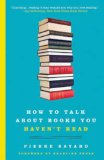Summary | Excerpt | Reviews | Beyond the Book | Readalikes | Genres & Themes | Author Bio

Critics' Opinion:
Readers' Opinion:
First Published:
Oct 2007, 208 pages
Paperback:
Sep 2009, 208 pages
 Book Reviewed by:
Book Reviewed by:
Amy Reading
Buy This Book
This encounter with the infinity of available books offers a certain
encouragement not to read at all. Faced with a quantity of books so vast that
nearly all of them must remain unknown, how can we escape the conclusion that
even a lifetime of reading is utterly in vain?
Reading is first and foremost non-reading. Even in the case of the most
passionate lifelong readers, the act of picking up and opening a book masks the
countergesture that occurs at the same time: the involuntary act of not picking
up and not opening all the other books in the universe.
If The Man Without Qualities brings up the problem of how cultural literacy
intersects with the infinite, it also presents a possible solution, one adopted
by the librarian helping General Stumm. This librarian has found a way to orient
himself among the millions of volumes in his library, if not among all the books
in the world. His technique is extraordinary in its simplicity: "When I didn't
let go of him he suddenly pulled himself up, rearing up in those wobbly pants of
his, and said in a slow, very emphatic way, as though the time had come to give
away the ultimate secret: 'General,' he said, 'if you want to know how I know
about every book here, I can tell you! Because I never read any of them.'" The
general is astonished by this unusual librarian, who vigilantly avoids reading
not for any want of culture, but, on the contrary, in order to better know his
books: "It was almost too much, I tell you! But when he saw how stunned I was,
he explained himself. 'The secret of a good librarian is that he never reads
anything more of the literature in his charge than the titles and the table of
contents. Anyone who lets himself go and starts reading a book is lost as a
librarian,' he explained. 'He's bound to lose perspective.'
'So,' I said, trying to catch my breath, 'you never read a single book?'
'Never. Only the catalogs.'
'But aren't you a Ph.D.?'
'Certainly I am. I teach at the university, as a special lecturer in Library
Science. Library Science is a special field leading to a degree, you know," he
explained. "How many systems do you suppose there are, General, for the
arrangement and preservation of books, cataloging of titles, correcting
misprints and misinformation on title pages, and the like?'"
Musil's librarian thus keeps himself from entering into the books under his
care, but he is far from indifferent or hostile toward them, as one might
suppose. On the contrary, it is his love of books—of all books—that incites him
to remain prudently on their periphery, for fear that too pronounced an interest
in one of them might cause him to neglect the others.
To me, the wisdom of Musil's librarian lies in this idea of maintaining
perspective. What he says about libraries, indeed, is probably true of cultural
literacy in general: he who pokes his nose into a book is abandoning true
cultivation, and perhaps even reading itself. For there is necessarily a choice
to be made, given the number of books in existence, between the overall view and
each individual book, and all reading is a squandering of energy in the
difficult and time-consuming attempt to master the whole.
The wisdom of this position lies first of all in the importance it accords to
totality, in its suggestion that to be truly cultured, we should tend toward
exhaustiveness rather than the accumulation of isolated bits of knowledge.
Moreover, the search for totality changes how we look at each book, allowing us
to move beyond its individuality to the relations it enjoys with others….
The idea of perspective so central to the librarian's reasoning has
considerable bearing for us on the practical level. It is an intuitive grasp of
this same concept that allows certain privileged individuals to escape unharmed
from situations in which they might otherwise be accused of being flagrantly
culturally deficient.
Excerpted from How to Talk About Books You Haven't Read by Pierre Bayard Copyright © 2007 by Pierre Bayard. Excerpted by permission of Bloomsbury USA. All rights reserved. No part of this excerpt may be reproduced or reprinted without permission in writing from the publisher.





The Funeral Cryer by Wenyan Lu
Debut novelist Wenyan Lu brings us this witty yet profound story about one woman's midlife reawakening in contemporary rural China.
Your guide toexceptional books
BookBrowse seeks out and recommends the best in contemporary fiction and nonfiction—books that not only engage and entertain but also deepen our understanding of ourselves and the world around us.